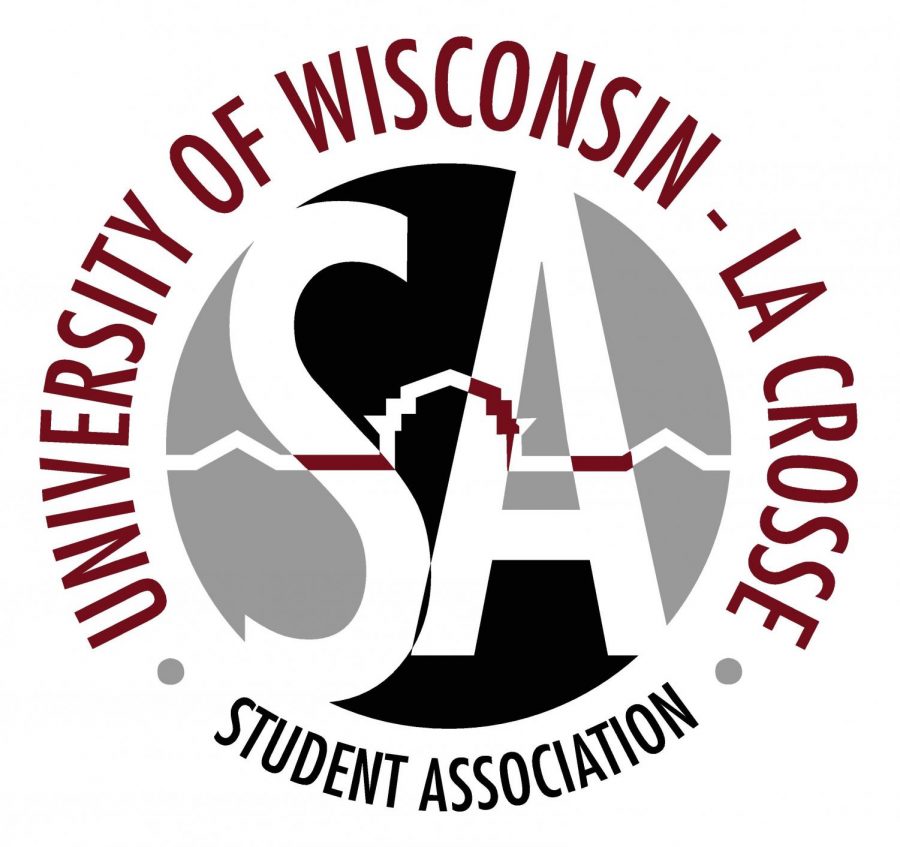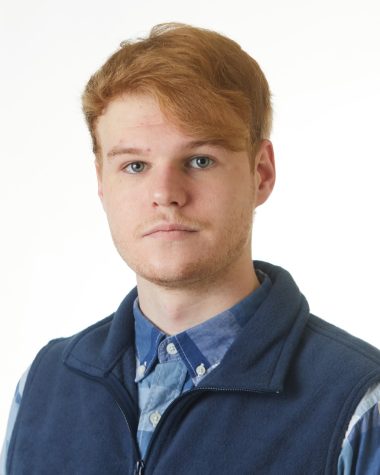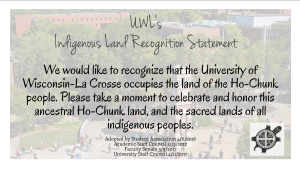“We knew this was going to happen”: Student Association discusses UWL College Republican’s chalking incident
October 20, 2022
On Wednesday, Oct. 19, the University of Wisconsin-La Crosse Student Association (SA) met with two guest speakers, Wisconsin Salt Wise Sustainability and Development Coordinator Allison Madison and Vice Chancellor for Student Affairs Vitaliano Figueroa. SA passed three resolutions during the meeting and discussed the UWL College Republican’s chalking incident that occurred on Oct. 11.
Wisconsin Salt Wise is a coalition of different organizations working towards reducing salt pollution in Wisconsin’s lakes, streams, and drinking water. According to their website, “Chloride from salt is infiltrating into our lakes, streams, and groundwater,” and the salt is coming from four main sources: Road salt, water softeners, dust suppressants, and fertilizers.
Wisconsin Salt Wise Sustainability and Development Coordinator Allison Madison spoke at the meeting and discussed the problems Salt Wise is facing and some of the things they’re working towards for the future. “[Salt Wise] is all about taking care of our water and keeping freshwater fresh in Wisconsin. We’re not on a good trajectory right now so changes need to happen.” For more information on Wisconsin Salt Wise, click here to visit their website.
SA met with Vice Chancellor for Student Affairs Vitaliano Figueroa. “In terms of the division of Student Affairs, we’re really here to try to provide students with the support and consistence they need outside of class,” said Vice Chancellor Figueroa.
Vice Chancellor Figueroa said two important things that Student Affairs work on are student engagement and support. “One initiative that we’re currently working on and will continue to work on is student engagement–trying to make sure that our students at UWL are engaged in a fashion that is very high,” he said. Vice Chancellor Figueroa continued and said it’s important to connect with students in a meaningful way to ensure they’re receiving the support they need and that they’re connected to campus.
SA discussed three resolutions at the meeting. The first resolution was drafted to recommend faculty members to have leniency in attendance policy for classes during the Nov. 8 election, and SA passed the resolution.
The second resolution discussed in the meeting was to approve the fall 2022 election results for first-year senator positions. SA suspended the two-week rule and passed the resolution. Cameron Seebruch was then sworn in as a senator by SA President Grant Mathu.
SA discussed one last resolution to approve Senator Carter Drost to serve on the Search and Screen Committee for the associate dean for the School of Education (SOE). SA suspended the two-week rule and the resolution was passed.
SA then opened the floor to discussion on hate and bias incidents around campus and the chalking incident. Senator Ryan Sperling said, “Free speech makes it very difficult to enforce any sort of administrative action on a college campus…However, there’s a difference between free speech and harassment and genuine threats.”
Senator Sperling said, “[The chalking] seems to me as a genuine threat against a marginalized, ethnic, and religious community,” and, “When I saw Joe Gow’s email about this specific incident, I was very confused at the lack of any specified action being taken.” Senator Sperling continued and said, “I think that we need to take strong action because if incidents like this go unchecked, not only does that genuinely put the safety of us students in compromise, but it can also deter future students from attending UWL.”
Dean of Students Kara Ostlund spoke to SA about the chalking incident and said, “The chalking technically, legally, is not a threat. It is very discouraging that individuals may have written this on our campus, but legally, it is not a threat. Def-con three does refer to military preparedness, and so if you look at: ‘Kanye was right, let’s be prepared,’ legally, that’s what it means.”
Dean Ostlund said that even if there was an investigation, or if someone or a group of individuals were being held accountable by the university, they would not be able to share that information at large.
The individuals responsible for the chalking have not yet been identified. Senator Drost said he wanted to consider actions SA could take to “flush out” the members of the College Republicans who were responsible. Senator Drost said he proposes that SA drafts a resolution in response to the chalking incident “expressing [SA’s] disapproval of these actions.”
Interim Vice Chancellor for Diversity and Inclusion Dina Zavala attended the meeting to discuss the chalking incident with SA and some of the actions Diversity and Inclusion has taken. Interim Vice Chancellor Zavala said, “Everyone, I think was in shock.” She said that “[she and her colleagues] knew this was going to happen,” and “We knew this was the trend, so that’s why we contracted ADL to start doing trainings.”
ADL, according to its website, fights all forms of antisemitism and bias through innovation and partnerships. ADL monitors incidents of bias and analyzes relevant data to produce research, educates students, advocates for policy solutions, and responds locally through its regional network.
Vice Chancellor Zavala spoke about bias reports across campus and said most bias reports are submitted anonymously so it can be challenging to follow up on them unless those making the reports provide their contact information.
“I’m hearing you,” said Vice Chancellor Zavala, “And we know we need to do better. As a division, we are growing and we are changing, and we will continue to take more action.”
Senator Jenasea Hameister said she thinks the best option would be for UWL to restrict any chalking on campus. SA continued discussing different options and Senator Drost said he will be drafting a resolution which will be brought to SA in a future meeting.







